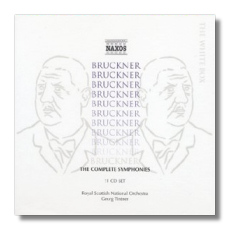
The Internet's Premier Classical Music Source
Related Links
- Bruckner Reviews
- Latest Reviews
- More Reviews
-
By Composer
-
Collections
DVD & Blu-ray
Books
Concert Reviews
Articles/Interviews
Software
Audio
Search Amazon
Recommended Links
Site News
 CD Review
CD Review
Anton Bruckner

Complete Symphonies
- "Study" Symphony in F minor (1863 - Nowak)
- Symphony #0 in D minor "Die Nulte" (1869 - Nowak)
- Symphony #1 in C minor (1866 - Linz; Carragan)
- Symphony #2 in C minor (1872 - Carragan) *
- Symphony #3 in D minor "Wagner" (1873 - Nowak)
- Symphony #4 in E Flat Major "Romantic" (1881 - Haas)
- Symphony #5 in B Flat Major (1878 - Nowak/Haas)
- Symphony #6 in A Major (1881 - Haas) **
- Symphony #7 in E Major (1883 - Haas)
- Symphony #8 in C minor (1887 - Nowak) *
- Symphony #9 in D minor (1896 - Nowak) *
Royal Scottish National Orchestra/Georg Tintner
* National Symphony Orchestra of Ireland/Georg Tintner
** New Zealand Symphony Orchestra/Georg Tintner
Naxos White Box 8.501101 11 CDs: 75:41, 71:22, 77:34, 72:09, 76:46, 59:47, 65:54, 64:16, 72:48, 60:02, 56:37
Most people never had heard of Georg Tintner before Naxos started recording his Bruckner symphonies. It wasn't long before curiosity mounted. Who was this conductor? Where had he come from? In some ways, it was like Günter Wand all over again. Then, matters took a morbid turn in 1999 when Maestro Tintner abruptly killed himself, apparently wishing to avoid the pain and humiliation of end-stage cancer. After the shock and grief subsided, collectors wondered what would become of his Bruckner cycle. It turned out that all the symphonies had been recorded, and those not yet issued were simply awaiting release by Naxos.
Now Naxos has reissued all of these Bruckner recordings in a single convenient box. Each disc is in a paper envelope, and all discs are housed in a white cardboard outer-box about an inch thick. The presentation is simple but not cheap-looking. Each box includes a chronology of cultural and historical events to set the composer's life in context. Other White Boxes are devoted to the complete symphonies of Arnold, Shostakovich, Tchaikovsky, and others, and additional White Box releases are scheduled for coming months.
Tinter was born in Vienna in 1917, studied with Felix Weingartner, and became Assistant Conductor at the Vienna Volksoper when he was still a teenager. When the Nazis invaded, Tintner came to New Zealand, and he spent the rest of his career holding positions and guesting primarily in New Zealand, Australia, England, and Canada. Canadian audiences came to know him well when he moved to that country in 1987. The Bruckner project for Naxos began in 1995, with a recording of the Sixth Symphony with the New Zealand Symphony Orchestra. It continued in Dublin, Ireland in 1996 (Symphonies #0, 2 and 8), and concluded in Glasgow, with sessions between April 1996 and September 1998.
As you voyage through Bruckner's symphonies, you could hardly ask for a more patient, knowledgeable, and understanding guide than Tintner. Other conductors who have recorded complete Bruckner cycles have hit higher highs than Tintner – they are more spectacular here, more probing there. Furthermore, Tintner can't efface an interpretation such as Karl Böhm's stereo Fourth or Bruno Walter's stereo Ninth. Tintner's orchestras, dependable as they are, don't have Bruckner's music coursing through their veins the way that the Berlin Philharmonic and the Vienna Philharmonic do. All the same, Tintner achieves a rare synergy: he knows how to get the best out of an orchestra, and he knows how to shape Bruckner's phrases, build his movements, and construct his symphonies. Tintner, while a master artisan, doesn't lack aesthetic taste, and sections such as the close of the Eighth Symphony's slow movement are as introspective and as philosophical as one could wish them to be. Elsewhere, there is power without ego, and drama without histrionics. Bruckner with more personality can be found elsewhere, but Bruckner with more integrity would be hard to find.
To match the performances, the sound has excellence without the "wow" factor. The booklet notes, unfortunately uncredited, are by Tintner himself, taken from the original releases.
Copyright © 2002, Raymond Tuttle


















